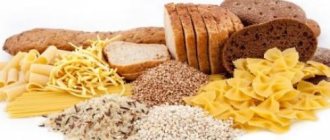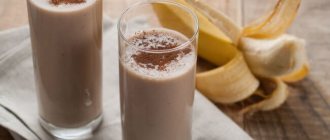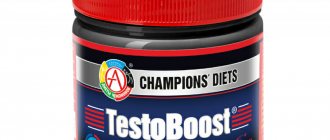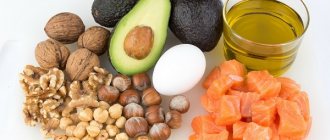Carbohydrates and their effects
Moving into molecular language, a carbohydrate is a combination of three chemical elements: oxygen, carbon, hydrogen. There are several forms of carbohydrate: sugar, starch, fiber. They are also divided into simple and complex, depending on the rate of their absorption in the body.
All types of carbohydrates are nutritious and necessary for the body because they produce glucose, a source of energy. The minimum portion of glucose that we regularly use is found in the blood; the rest, in the form of glycogen, is found in muscle tissue and the liver, and is used as needed between meals. When energy exceeds its norms in the body, glucose begins to turn into fat. However, when carbohydrate reserves are depleted, the body primarily begins to absorb protein from muscle tissue, rather than fat deposits. This is why it is very important to eat right and maintain glycogen levels so that carbohydrates act in the right direction when gaining muscle mass.
Classification of carbohydrates
Carbohydrates
- organic compounds that are part of all living organisms.
The lack of carbohydrates in food is manifested by symptoms reminiscent of starvation. There is rapid loss of water and sodium.
They are divided into monosaccharides, oligosaccharides and polysaccharides.
| Functions | Characteristic |
| Energy | The main substrate for energy production. |
| Structural | They are membrane components and participate in the production of lipids and non-essential amino acids. |
| Storage | Glycogen in the liver and muscles is a reserve of nutrients. |
| Regulatory | Digestive regulators. |
| Receptor | Cell receptors are glycoproteins. |
| Protective | Antibodies – glycoproteins, mucus, heparin. |
| Information | Ribose is a key component of RNA and DNA. |
- Simple carbohydrates
Water-soluble white crystals, sweet in taste, quickly absorbed, substrate for fermentation reactions. They have a higher glycemic index and cause insulin spikes in the blood.
Simple carbohydrates are called monosaccharides and oligosaccharides.
- Monosaccharides
Galactose, milk sugar, is a component of lactose and is found in milk.
Glucose, grape sugar - found in grapes, fruits, honey. It is the end product of the breakdown of complex carbohydrates in the body and is easily fermented.
Fructose, fruit sugar, is 2.5 times sweeter than glucose and does not cause a rise in insulin. Contained in honey and fruits. Worse to ferment.
- Oligosaccharides
Sucrose (glucose + fructose), cane beet sugar - table sugar. Contained in honey, dates, grapes, figs, persimmons, prunes, raisins. Displaces copper, chromium and B vitamins from the body, increasing the risk of developing CVD.
Lactose (glucose + galactose), milk sugar - easily transforms into adipose tissue (used for weight gain), stimulates the growth of lactic acid bacteria in the intestines.
Maltose (glucose + glucose), malt sugar, is an intermediate product of starch hydrolysis. Contained in wheat, rye, malt extracts, sprouted grains.
- Complex carbohydrates
Peculiarities:
- Low glycemic index.
- Does not cause insulin spikes.
- They have a mechanical effect on the intestines.
- Slow down the process of movement of the food bolus through the gastrointestinal tract.
Complex carbohydrates include polysaccharides. Polysaccharides are divided into homopolysaccharides and heteropolysaccharides.
- Homopolysaccharides
Starch is the stored energy of plants. Digestion of starch begins in the mouth. Contained in potatoes, cereals, pumpkin, peas.
Glycogen is animal starch, stored energy. Synthesized during digestion (1-2 hours after ingestion of carbohydrate foods), the largest amount of glycogen is stored in the form of granules in liver cells (2/5 - 150g), in skeletal muscles (1-3%), in the heart (0.5% ).
Cellulose (fiber) is the main component of the cell wall of higher plants, algae. Promotes the movement of food through the intestines, is broken down in the large intestine with the participation of microbiota, and inhibits the absorption of microelements.
Hemicellulose is better soluble in water and has sorption properties.
Lignin is the matrix of plants, determines their strength, the richest is coniferous wood, and from food sources: bran, stale vegetables. It is not digested in the intestines, reduces food digestion and absorption and has a high sorption capacity.
- Heteropolysaccharides
Pectin is present in the intercellular space of all higher plants, most of all in fruits. It has mild sorption and chelator properties.
We recommend
“Microelements in the body: consumption standards and methods of replenishing the deficiency” Read more
Inulin is similar to starch. Contained in underground parts of plants (mostly in Jerusalem artichoke, chicory), binds glucose, prebiotic.
Good and bad carbohydrates
Not all carbohydrates are good for the body. You should remember which foods contain simple and complex carbohydrates. Namely, the slower the sugar molecules are digested, the better. Each product has its own glycemic index. The faster the sugars are absorbed from this food, raising blood glucose levels, the higher the glycemic index.
Which carbohydrates are useless for gaining muscle mass? List of products with increased index:
- Fried potatoes.
- White bread.
- Mashed potatoes.
- Honey.
- Sugar.
- Muesli.
- Pasta.
- Beet.
- Bananas.
- Chocolate.
- Biscuit.
- White rice.
- Corn.
- Jam.
The following is a list of complex carbohydrates for gaining lean body mass:
- bran bread;
- cereals;
- oatmeal;
- peas;
- buckwheat;
- fresh fruit juice;
- Red beans;
- lentils;
- fresh fruits;
- black chocolate;
- soy;
- green vegetables;
- tomatoes;
- mushrooms;
- lemon.
Despite the fact that some of the listed products are a source of simple carbohydrates, fiber does not allow sugar to be produced and absorbed into the blood.
Foods rich in complex carbohydrates
| Product | Carbohydrate content per 100 grams, g |
| Cereals | |
| Cereals | 61 |
| Amaranth | 31 |
| Pearl barley | 65 |
| Bulgur | 76 |
| Millet | 67 |
| Brown rice | 74 |
| Wild rice | 75 |
| Whole grain spelled | 70 |
| Buckwheat | 57 |
| Quinoa | 64 |
| Barley grits | 66 |
| Whole wheat flour | 72 |
| Legumes | |
| Green pea | 15 |
| Beans raw | 12 |
| Dried beans | 49 |
| Chickpeas | 64 |
| Beans | 47 |
| Lentils | 60 |
| Peanut | 14 |
| Vegetables | |
| Carrot | 8 |
| Tomato | 4 |
| Celery | 2 |
| Beet | 6 |
| Turnip | 6 |
| Eggplant | 7 |
| Asparagus | 3 |
| Cucumber | 4 |
| Broccoli | 7 |
| Onion | 7 |
| Radish | 3 |
| Rhubarb | 4 |
| bell pepper | 7 |
| Fresh white cabbage | 5 |
| Red cabbage | 5 |
| Sea kale | 3 |
| Zucchini | 5 |
| Lettuce | 2 |
| Sorrel | 4 |
| Fruits | |
| Pomegranate | 15 |
| Green banana | 22 |
| Apples | 10 |
| Oranges | 8 |
| Figs | 12 |
| Peach | 10 |
| Pear | 11 |
| Grapefruit | 6 |
| Lemon | 3 |
| Avocado | 6 |
| Berries | |
| Cranberry | 4 |
| Prunes | 38 |
| Plum | 10 |
| Raspberries | 6 |
| Blueberry | 8 |
| Gooseberry | 9 |
| Strawberry | 8 |
| Cherries | 10 |
| Currant | 8 |
| Nuts, seeds | |
| Sunflower seeds | 16 |
| Pumpkin seeds | 17 |
| Linen | 12 |
| Sesame | 12 |
| Poppy | 15 |
| Hazelnut | 17 |
| Almonds raw | 20 |
| Cashew | 23 |
| Pine nut | 13 |
| Pistachios | 28 |
| Walnut | 16 |
Power in nutrition
The decision by some athletes to reduce their carbohydrate intake to reduce the likelihood of fat accumulation is a misconception. Complex carbohydrates for gaining muscle mass, especially those with a low glycemic index, are very important. Proper consumption of this biological fuel makes it possible to train harder and longer, increase the load from exercise, gain muscle mass and at the same time burn excess fat. Limiting yourself in carbohydrates, on the contrary, reduces endurance and mental performance due to a drop in glucose levels. It is very important to eat foods that are digested more slowly, are rich in fiber, and combine them with the right amount of protein and fat.
How many carbohydrates do you need to gain weight?
To optimize muscle growth, you need to eat in a slight excess of calories (called a "surplus"). This means that the level of energy received from food should be higher than you spent during the day. The excess should be about 200 calories, but this number can be adjusted individually depending on your individual characteristics and desired results.
So, in order to ensure stable muscle growth, you need to consume 1.6-2.2 g of protein per 1 kg of body weight. The rest of your body's caloric needs will come from fats and carbohydrates. However, make sure that their content is not too low. Too little fat in your diet can be detrimental to your health, and too little carbohydrate can impair your performance in the gym.
Calculate your daily requirement
Why is carb counting so important? Judge for yourself: if you don't consume enough calories to provide your body with the energy it needs to train, you simply won't be able to build as much muscle, and the time you spend in the gym will be wasted.
If your diet contains too many carbohydrates (read: calories), then you will gain more fat tissue than you would like. To lose excess weight, you will have to go on a diet. Therefore, you will spend even more time to get the body of your dreams.
Calculating your daily intake will only take you a couple of minutes, but it will save you weeks or even months of merciless training!
If you do strength training, eat more carbohydrates
Intense exercise, such as heavy weight training, uses up almost all of your carbohydrate reserves because the body needs a lot of energy to perform such activities.
The less energy in the body, the faster it gets tired, and the faster your strength runs out. Of course, you can build muscle without eating carbohydrates. However, you are likely to gain much more muscle in a much shorter period of time if you eat enough carbohydrates in your diet.
Most bodybuilders consume about 2-6 grams of carbohydrates per 1 kg of their body weight. But it's worth considering that your personal needs will depend on how often you exercise. The more frequent your workouts, the more carbohydrates you need, and vice versa.
Formula for calculating the daily norm of BZHU for muscle growth
- Set the total number of calories you need to gain weight.
- Set the required ratio of protein and fat in your diet.
- Add up the number of calories you get from protein and fat. Then subtract this value from your total daily calorie intake.
- Convert the resulting amount of calories into carbohydrates (1 gram contains 4 kcal).
- Adjust their amount to provide your body with energy during strength training.
Remember that the more often and more you exercise, the more energy your body needs.
If you need to increase your carbohydrate intake, instead of changing the protein content of your diet, reduce your fat intake.
Diet before and after training
Glucose, which is quickly converted into energy and also quickly consumed during exercise, cannot be a complete source of nutrients.
List of foods with carbohydrates for gaining muscle mass:
- Brown rice
- All cereals.
- Wholemeal pasta.
- Skim cheese.
- Chinese noodles.
There are two possible exceptions to the rules regarding nutrition, before and after strength training. One hour before physical training, you can consume carbohydrates with a high glycemic index, for example, kefir, boiled potatoes, low-fat yogurt, at the rate of 1 gram of carbohydrates per kilogram of weight.
30 minutes after exercise, it is recommended to replenish lost energy with foods with an average glycemic index: special sweet protein drinks, totaling 100 grams of carbohydrates. Protein activates glycogen production in muscles and liver.
Why are carbohydrates so important for gaining muscle mass?
Foods high in carbohydrates do not have a very good reputation in the modern world. Over and over again they try to convince men that such products lead to obesity, and in general that they are harmful to health. But is this really so?
The importance of this macronutrient in the proper nutrition of athletes cannot be underestimated, especially when it comes to building muscle mass at home.
Carbohydrates are a kind of fuel that provides our body with the energy it needs to work. Of course, even on a low-carbohydrate diet, our body will be able to obtain energy, for example, by burning fat or protein. However, in terms of energy value, nothing compares to carbohydrates.
We recommend reading: how to gain muscle mass for a girl.
By providing your muscles with enough glycogen, you can significantly increase the amount of work you do, which in turn will significantly accelerate the growth of your muscles.
Carbohydrates affect muscle growth not only directly, but also indirectly. They stimulate protein synthesis, which plays a key role in the process of muscle growth.
Additionally, studies have shown that carbohydrates improve sleep quality. So feel free to eat a piece of crispy whole grain toast before you go to bed and your muscles will thank you. Good sleep is the key to muscle growth.
Athlete's diet
A sports diet involves determining the calorie content of all food consumed in order to determine how many carbohydrates are needed to gain muscle mass, and what is their daily requirement, in combination with fats and proteins. To grow muscles, a man needs to increase his caloric intake per day by about 20 percent. The average daily intake is 2700-3000 calories.
It is important that the products contain the most correct carbohydrates and fats, otherwise the diet will lead to a set of fat deposits rather than muscle growth.
How much carbohydrates, fats and proteins to eat to gain muscle mass:
- fats should make up 30-35 percent of daily calories, preferably in the form of vegetable oil,
- carbohydrates, only with a low glycemic index, about 50-60 percent,
- proteins – no more than 25 percent.
Why does an athlete need carbohydrates?
Why is this perhaps the most demonized macronutrient in the sports environment so important? Aren't carbohydrates a source of excess calories and excess fat?
The truth is, no. These saccharides play a much more important role than it might seem at first glance. Let's find out why they are so necessary in bodybuilding.
Gives you energy to workout
In fact, carbohydrates deserve much more attention than we are used to giving them. Firstly, they are the main source of energy for our body. Even if our diet is full of fats and proteins, they are not able to charge us the way carbohydrates do.
Reducing their number is not suitable for those athletes who actively train and want to build a large amount of lean muscle mass. All this is because intense strength training for muscle hypertrophy requires a significant expenditure of energy, which this diet simply cannot provide, because it does not contain carbohydrates!
In addition, a low-carb diet leaves your body deficient in sugars, so during a workout you may feel exhausted after the first set. Provide your muscles with enough glycogen and you'll be fine again.
Thus, by charging you with energy, carbohydrates give you more strength to train, thanks to which your muscles increase. It is logical to assume that if you are energetic and full of strength, then you will be able to work out much harder. The harder the workout, the more microcellular damage occurs. And the more such damage to muscle fibers occurs, the greater the potential for their further growth (of course, subject to proper recovery).
Carbohydrates and proteins interact with each other
Protein synthesis is a process that results in the creation of new protein in the cells of our body. The process of protein synthesis occurs along with the process of protein degradation, that is, the decomposition of protein cells.
Proteins are used by our body to repair and strengthen damaged muscles. If protein synthesis is insufficient, then your muscle fibers damaged by training cannot be repaired, which will ultimately lead to loss of lean muscle mass.
The vast majority of scientists agree that eating after exercise stimulates protein synthesis. Does this mean you should knock over your protein shake before the thrown dumbbells even hit the floor? Of course not.
It is optimal to eat a high protein meal within two hours after training.
! Forget about the 30-minute anabolic window! This ploy is just a marketing ploy and nothing more.
There is now research that shows that carbohydrates actually stimulate protein synthesis. This is one of the reasons why fast carbohydrates should be included in the “post-workout” meal.
“Obviously, this is due to the fact that when carbohydrates are detected in the body, insulin production is stimulated in the body. This process helps supply the muscles with amino acids, which speed up protein regeneration.”
When it comes to carbohydrates, the sooner your body can get them, the better. So, if you can, try having a lighter post-workout snack with a lower glycemic index.
Retains protein in the body
Another great thing about carbohydrates is that they help the body get energy from sources other than protein. Therefore, foods containing carbohydrates can be not only tasty, but also healthy.
Remember what we said about them being a great source of energy? So, when you provide your body with enough carbohydrates, two things happen. First, if you're just about to get a good workout in, your blood sugar will be used as fuel by your body during the training session.
Not training? Well, then the carbohydrates will be stored in your muscles and liver as glycogen stores. And when you decide to exercise, say, an hour or two after eating, your body will convert glycogen back into glucose, which will again act as a source of energy.
But what do you do if you haven't refueled with carbohydrates?
If your tank doesn't have enough fuel in the form of fats or carbohydrates, your body will begin to take energy directly from muscle tissue. Which is especially bad if your goal is to gain weight.
If your diet is rich in protein foods, then this will undoubtedly provide the body with the necessary energy. However, the remaining protein will clearly not be enough for muscle growth.
! Moreover, the problem of energy deficiency does not lose its relevance even after you have completed your workout. After strenuous exercise, your body's glycogen and fat stores are low, but your body still needs energy to recover. And where will it get it from? That's right, from your muscles earned by sweat and blood.
So how to solve this problem? Consume more carbohydrates!
Accelerates recovery after training
As you know, the key to gaining muscle is the period of rest and recovery.
After finishing your workout, your body is more hungry than ever to replenish its glycogen stores. Scientists believe that the faster you replenish your carbohydrate reserves, the better it will be for your body.
We have already mentioned that carbohydrates have a positive effect on muscle building. They can help improve protein synthesis, which helps your muscles grow better and become stronger.
However, carbohydrates are useful not only for muscle growth, but also for their recovery.
Can prevent colds
Research shows that complex carbohydrates help strengthen the immune system.
Intense exercise is known to increase the risk of illnesses such as colds and flu. Simply put, vigorous exercise suppresses your immune system, making you more susceptible to illness, especially during recovery.
Scientists have found that carbohydrates can prevent colds. This appears to be because they alleviate exercise-induced immunosuppression.
To build muscle mass, you need to exercise regularly. Thus, while protecting you from colds, carbohydrates help you increase muscle size, albeit indirectly.
Additionally, studies have shown that carbohydrate intake is directly related to sleep quality
! Sleep is the most important recovery period for an athlete. During such rest, your muscles recover and grow fastest. In addition, the body releases the most growth hormone during sleep.
Healthy sleep also affects your testosterone levels, which directly affects muscle growth.
Poor sleep can lead to low testosterone levels, even if you are in your prime. Over time, chronic lack of sleep will seriously impact your body's ability to gain weight.
So how do carbohydrates affect sleep?
First, they help you fall asleep. This means that you will reach the most optimal state of rest much faster. That is, the faster you fall asleep, the faster you start the process of anabolism, due to which your muscles grow.
Secondly, carbohydrates can improve sleep quality. Research has found a link between a high-carbohydrate diet in men and improved quality of REM sleep, which leaves you feeling more refreshed and rested.
Thus, good and quality sleep not only promotes muscle growth and testosterone production, but also energizes you. What else, if not vigor, is so important for effective training?
Diet
What an approximate diet should look like:
- Morning. For breakfast, carbohydrates are required to gain muscle mass, and not fast ones, but complex ones, for example, oatmeal with fruit or honey.
- Dinner. During lunch, consume the most calories of the day. Without this, muscles will not grow, and fat deposits will also be minimized.
- Day. A healthy snack can consist of dried fruits, nuts or an omelette.
- Dinner. Light protein foods, such as lean fish or meat, with stewed vegetables in olive oil. Buckwheat is a source of carbohydrates.
Complex carbohydrates
What are complex carbohydrates
Complex carbohydrates are organic compounds whose main sources are plant foods. This component is considered the main food element that carries energy. There is a list of foods with complex carbohydrates. Among them, mention should be made of potatoes and cereals, which contain the bulk of this substance. In various diets, the content of this element should reach fifty percent to ensure energy balance.
The structure of complex carbohydrates is represented by at least two molecules of monosaccharides (simple sugars), which, in turn, are digestible and non-digestible (fiber). Their synthesis is carried out by plants during the process of photosynthesis. They may contain several or thousands of molecules of simple sugars connected by glycosidic bonds.
Types of complex carbohydrates
It is widely known that carbohydrates are the main source of energy needed by the human body. Simple and complex carbohydrates differ in their structure. Simple ones are distinguished by their rapid digestibility and the achievement of an instant feeling of satiety. At the same time, they contribute to an increase in blood sugar levels, which leads to a slowdown in metabolic processes. After eating, they are transformed into sugar, which becomes fat deposits. The content of these chemical compounds is high in the following foods: from milk to fruits, from some vegetables and sweets.
Due to the content of this element in sweets, they help to quickly but short-term satisfy hunger. The table of foods with slow carbohydrates contains food options with a complex structure. They are characterized by long-term absorption, which helps to provide the body with energy for a long time. They are recommended for use in diets, due to the guarantee of quick and long-lasting satiety in combination with proper digestion.
They are found in a variety of foods: from grains to legumes, from beets to potatoes, from carrots to nuts. Their use does not cause insulin spikes.
What are complex carbohydrates?
- Starch, represented by large quantities of glucose molecules. Starch is a substance that is soluble in water and normalizes digestion. Contained in various products: from rice to potatoes, from buckwheat to pasta.
- Fiber has an overly complex structure, which allows for only partial digestion. Fiber helps lower cholesterol levels and increase the efficiency of food absorption. Found in a variety of foods: from whole grains to apples, from kiwis to grapes, from nuts to vegetables.
- Glycogen is an energy reserve that accumulates in the body. Contained in fish, liver and other offal.
- Pectin is a polysaccharide that helps destroy toxins and other harmful substances. Found in cucumbers, root vegetables, cucumbers.
Why are they useful?
We can talk about the beneficial properties of slow carbohydrate sources for a long time. They cope with the main function, being a source of energy. Due to the lack of elements characteristic of many diets, problems associated with starvation of brain cells may begin. This leads to loss of concentration, increased absent-mindedness and inattention. Thanks to their sufficient quantity, mental activity increases, which improves physical activity.
When asked why complex carbohydrates are useful, you can spend a long time enumerating them. They help speed up metabolic processes. Due to their deficiency, prolactin and cortisol are formed, and the thyroid gland becomes less active. These problems lead to increased feelings of fatigue and worsening mood. Externally, these processes manifest themselves in the occurrence of edema. Glycogen, in combination with fiber, helps block the formation of harmful hormones and significantly improve overall mood. Let us also note the beneficial effects of these substances on digestion. Thanks to their use, the absorption of vitamins becomes more efficient. They help achieve a long-lasting and quick feeling of satiety.
Foods with complex carbohydrates
Nutritionists recommend consuming foods that contain complex carbohydrates to speed up metabolism, without wasting glucose, with its gradual accumulation, and without the formation of unnecessary fat reserves.
Let's move on to the list of products. There are several categories of sources of complex carbohydrates.
Vegetables, greens
Valuable sources include: from carrots to cucumbers, from beets to celery, from potatoes to pumpkin, from olives to tomatoes, from onions to garlic, from cabbage to exotic Brussels sprouts. Even seaweed is recommended to be included in the diet, in combination with lettuce and, of course, spinach.
Calculation of carbohydrates
How many carbohydrates do you need to gain muscle mass? Of the total calories consumed during the day, about 50-60 percent should be carbohydrates. 1 gram of carbohydrates = 4 calories. Let's say an athlete consumes 3,000 calories per day. 50 percent is 1,500 calories. Now we divide the amount of 1500 by 4 and we get 375 grams of carbohydrates per day.
Further, the amount of carbohydrates for gaining muscle mass will depend on the goal: if the goal is to gain weight, we consume about 500 calories with carbohydrates plus, if the goal is to dry the body, then 500 calories less.
Complex carbohydrates for weight loss
Fast and effective weight loss is based on the principles of proper nutrition, which consists of a balanced intake of proteins, fats and complex carbohydrates, excluding foods with simple carbohydrates, as well as ensuring a calorie deficit of 10-15% of the daily value.
When creating a diet for weight loss that can be used for a long time, the following rules must be taken into account:
- calculate and strictly adhere to the carbohydrate norm (4 grams per kilogram of desired weight);
- include slow carbohydrates in the form of vegetables and grains in the menu, which will provide the body with fiber and pectic acids;
- eat more fresh vegetables;
- limit the amount of starchy vegetables (potatoes, zucchini) and fruits in the diet;
- eat 4 times a day;
- drink enough water.
There are diets based on the use of one or more complex carbohydrate foods in the absence of other nutrients, for example:
- Buckwheat - a seven-day diet using buckwheat porridge cooked in water without salt. You can include 2-3 sour apples in the menu.
- The “6 cereals” diet is a dietary meal lasting one week. For six days you need to eat one of the types of cereals (wheat, millet, oatmeal, rice, barley, pearl barley), and on the seventh day choose either one of the proposed cereals or a mixture of all varieties (2 tablespoons each). The last meal on the diet should be no later than 18.00.
- Losing weight on barley - the diet is limited to pearl barley boiled in water without salt for 5 or 7 days.
- Potato diet - for 3 days you should eat 1 kilogram of baked potatoes (4-5 meals) with dill or parsley, but without salt and butter. You are allowed to drink black or green tea without sugar.
- Beets and carrots - the basis of the diet on this diet are raw, baked and boiled root vegetables in unlimited quantities. You can cook vegetables by adding a pinch of salt and olive oil. For a greater feeling of fullness after breakfast, you are allowed to eat 3 walnuts.
- Pectin diet - based on the consumption of apples, parsley and green onions with the additional addition of various cereals (rice, buckwheat) and vegetables (cabbage, cucumbers, peppers) for 5 days.
When following any of these carbohydrate diets, caloric intake should be controlled, since with an excess of calories, weight increases due to the conversion of energy into subcutaneous fat.
Protein norm per day
To increase muscles, in addition to carbohydrates, you also need proteins. The daily norm is 1.5-2.5 grams of protein per kilogram of body weight. To gain muscle mass by weight category you need:
- For men: weight 60 kg – 190 grams of protein, weight 70 kg – 200 grams, weight 80 kg – 210 grams.
- Women: weight 60 kg – 155 grams, weight 70 kg – 175 grams, weight 80 kg – 185 grams of protein.
The presence of fats is also important, especially omega-3 fatty acids. Lack of fat reduces hormone production and immunity.
What are carbohydrates?
Carbohydrates are organic substances that are the main source of calories for the body. They provide the necessary energy and promote muscle growth.
There are 3 types of carbohydrates:
- Quick (simple), easily digestible, necessary for athletes immediately after training for recovery. They are also classified as sugars. Simple carbohydrates, in turn, are divided into disaccharides and monosaccharides.
- Slow (complex) carbohydrates (this is a complex of 3 or more simple carbohydrates) are needed during intense and heavy physical activity. These carbohydrates are taken 1.5 - 2 hours before training.
- Indigestible (fibrous/slow) – this type includes dietary fiber (starch, dextrin, glycogen and cellulose).
Where to get carbohydrates from
So, the first priority is to create a diet that will provide a sufficient amount of carbohydrates. We recommend that you remember the main sources.
Simple carbohydrates are found in:
- Sahara
- Mede
- Glucose
- Raisins
- Watermelons
- Mashed potatoes
- White rice and so on
Sources of complex carbohydrates:
- legumes (beans, peas, lentils, beans, etc.);
- cereals, porridges - grains and cereals;
- whole wheat pasta, barley;
- fruits (grapefruit, pear, orange, apple, peach);
- berries (cherry, plum);
- vegetables (all types of cabbage, tomatoes, zucchini, bell peppers, onions, leeks, green beans);
- greens (spinach, lettuce); mushrooms.
- Dried apricots
Thanks to the varied list of products, you can diversify your menu without giving up the pleasure of eating delicious food.
Insulin
The hormone insulin is produced by the pancreas and transports nutrients to cells, lowering blood sugar levels. When carbohydrates are broken down, the body actively begins to produce insulin, which transfers glucose to the muscles in the form of glycogen. In addition, insulin promotes the restoration of muscle tissue and its further growth. Glycogen, proteins and fats begin to be synthesized, and muscle cells actively absorb amino acids.
The main thing is to remember which carbohydrates are more important for gaining muscle mass: complex ones, which take longer to digest and gradually turn into glucose.
Glycemic index of carbohydrates
The glycemic index of carbohydrates is influenced by:
- Carbohydrate structure
The most easily digestible carbohydrate is glucose, since after absorption it can be directly delivered by the blood to organs and tissues. Accordingly, other carbohydrates first require conversion to glucose.
Fructose, although a monosaccharide, requires a fairly long sequence of biochemical reactions to be converted into glucose and therefore has a relatively low glycemic index for a monosaccharide.
On the other hand, most disaccharides (sucrose, lactose) contain a relatively easily cleaved glucose fragment in the molecule. For example, the GI of maltose (malt sugar) for glucose is above 100, since the molecule consists of two glucose molecules.
- Particle size
The smaller the particles of carbohydrate food (for example, flour milling), the faster they are digested in the gastrointestinal tract.
- Degree of heat and cooking
Starches are partially broken down when heated. Consequently, the glycemic index increases with increasing duration and intensity of heating. An acidic environment also promotes the breakdown of starches.
- Content of fiber, protein and fat in the product
All these components slow down the absorption of carbohydrates. Fat also slows down secretion, which means the time food stays in the stomach increases. Carbohydrates are mainly absorbed in the intestines, therefore, the faster they get there, the higher the glycemic index.
- Food consistency
Naturally, liquids are the easiest to digest. The presence and density of cell membranes, various partitions and fibrous structures are also important.
- Food absorption rate
On the one hand, hasty swallowing partially speeds up the processing of food, on the other hand, the presence of unchewed pieces interferes with the full absorption of food components.
Using this formula as an example, you can compare the glycemic index of a donut and watermelon
:
Donut GI = 76, carbohydrate content 38.8. GN = (76 * 38.8): 100 = 29.5 g.
Watermelon GI = 75, carbohydrate content 6.8. GN = (75 * 6.8): 100 = 6.6 g.
Glycemic load:
Additional Products
To diversify your sports diet, you should know about foods with carbohydrates for gaining muscle mass and what additional nutrients they contain:
- Sunflower seeds. Source of protein and vitamin E. Reduces the negative effects of free radicals on muscle cells and restores them.
- Mackerel. Omega-3 fatty acids slow down the body's breakdown of protein until after exercise, another source of protein enters the stomach and is digested. Fish eaten for breakfast will have the same effect, even if enough time has passed before the start and end of the workout. And vitamin C, like collagen, is needed for the elasticity of muscles and ligaments.
- A pineapple. This fruit contains the enzyme bromelain, which helps digest proteins. It also reduces the muscle pain threshold after exercise.
- Venison. The meat of forest animals contains a lot of vitamin B12. This vitamin actively digests protein necessary for muscle growth. The main thing is to cook it correctly so that the meat is not tough.
- Coffee. Reduces muscle pain, thereby increasing the duration of training. Can be replaced with green tea.
- Beef. The best of all types of meat for an athlete's diet. Contains amino acids and creatine, which increase muscle mass and reduce fat mass. Promotes physical endurance.
- Ginger. The best pain reliever, of natural origin.
- Natural yogurt. Natural yoghurts are healthier because they contain fewer chemical additives and sugar. If desired, you can add fresh fruit. Lactic acid bacteria stimulate digestion and absorption of large doses of protein.
- Turmeric. The spice affects the restoration and growth of new cells, so necessary after strength training.
- Cucumbers. It is the cucumber peel that contains substances that strengthen the connective tissue of the human body.
- Milk. Muscles and bones need calcium. Give preference to milk with 3.5 percent fat content.
- Buckwheat. This cereal is rich in amino acids, which strengthen blood vessels and promote muscle growth. Strengthening blood vessels is important, since power loads significantly strain the circulatory system.
- Almonds. Vitamin E from almonds restores muscle cells faster after workouts. Daily dose – 8-10 pieces of sweet nut. In addition to physical strength, almonds improve your mood.
- Paste. Natural applesauce pastille is perfect if you want something sweet. It has a minimal amount of fat and calories, but a lot of protein.
- Eggs. In addition to protein, chicken eggs contain vitamin D, which is good for the elasticity of muscles and ligaments. However, you should not consume more than ten pieces per week.
- Tuna. One hundred percent protein. Consume one hour after strength training.
- Sweet red pepper. Contains a large amount of vitamin C, and without this antioxidant it is almost impossible to gain muscle mass. Choose only very red peppers.
- Lentils. Source of protein, iron, zinc. An important product for a sports diet.
- Asparagus. Champion in protein content, as well as potassium, zinc and fiber.
- Spirulina algae. This product consists of 65 percent protein, beta-carotene. It is recommended to add it to cocktails after consulting with your doctor, as it is a medicinal dietary supplement.
- Water. During the entire workout, be sure to drink water, as it quickly leaves the body. And a large loss of fluid prevents the body from working in the right direction.
So, the opinion that carbohydrates are evil and should be consumed as little as possible is wrong. The problem is not the carbohydrates themselves, but what they are, and how often we consume simple, quickly digestible substances that provide instant energy, thereby deceiving the body. Properly selected and planned nutrition will not only preserve your health, but also make your body beautiful and pumped up.
Beneficial properties of complex carbohydrates
Complex carbohydrates not only replenish the body’s energy costs, but also normalize the functioning of the digestive tract, as they have the following beneficial properties:
- starch in the composition of complex carbohydrates ensures a uniform supply of energy and a long-lasting feeling of satiety, as they are absorbed in the small intestine, contribute to a slow increase in blood sugar over 2-3 hours and do not cause insulin spikes and increased pancreatic activity;
- fiber is not broken down in the body, but ensures normal intestinal function, enhances the secretion of intestinal enzymes and bile secretion, and promotes the removal of cholesterol from the body;
- Pectic acids protect the mucous membrane of the digestive tract from mechanical and chemical irritation by food, and also glue and remove pathogenic, putrefactive microflora and toxins.











